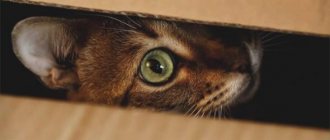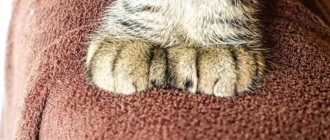Why does a cat need to hide?
Some cats prefer to sleep next to their owner from childhood, and then it becomes a habit for them. A little kitten is scared and cold alone, but under the blanket it is cozy and pleasant. Many pets like to sleep with a blanket on top, leaving only their nose and ears outside. They consider this quite convenient, because the owner also sleeps like this. You can also put your head on the pillow.
If the cat does not have his own house, then you should not ask why he chooses a bed or sofa. The need to find a safe hiding place can arise in a cat for various reasons.
The cat crawls under the blanket because:
- sick and looking for warmth;
- awaits the appearance of offspring;
- loves comfortable rest;
- wants to smell the owner;
- marks its territory;
- rarely sees the mistress of the house;
- wants to be safe.
Since a cat's body temperature is slightly higher than a person's, it is more acceptable for her to sleep in a warm place, for example, under a woolen blanket or rug. The blanket itself cannot provide warmth, but it effectively reduces heat loss and helps the animal maintain a constant body temperature.
Pregnant cats look for a secluded, quiet place. They understand that kittens also need warmth, so they choose a comfortable place.
Another important reason is the desire to feel comfortable. The bed and blanket are soft and pleasant. Every second cat usually prefers a hard surface to a soft one. It is much more comfortable for a small kitten to sleep on a soft one; it reminds him of his mother, the company of brothers and sisters with whom he grew up. Elderly cats may be bothered by joint pain, which subsides a little in a warm place. It is much more comfortable for them to lie on a soft bed.
All living creatures strive for peace, and reliable shelter allows them not just to doze off, but to fall asleep deeply. It is the deep sleep phase that allows you to truly restore the strength lost during the day. It is during this period that the animals’ immunity works in full force, the processes of cell division in the body are activated, and tissue renewal occurs. So you shouldn’t be surprised that the cat tries to crawl under the covers or blankets on its own. This behavior of a pet is quite understandable and understandable.
Sometimes you can notice that the cat is moving its paws over the blanket.
This could be due to several reasons:
- the animal shows that it feels good and pleasant at the moment;
- a childish reflex appears when, as a kitten, a cat kneaded its mother’s belly to get milk;
- In this way, the pet marks its territory, because on the pads of the cat’s paws there are glands that secrete secretions.
Scientists have found that constant stress and the inability to get enough sleep lead to premature aging of animals and various diseases.
Usually a cat hides in a dark place for its own safety. Life is filled with fears and stressful situations. Climbing into a closet with clothes or under a blanket, he feels the familiar smell of the owner and finds peace.
Not all animals can be alone for a long time and really don’t like it when the owner goes to work during the day and returns home late. Lack of communication and the need to be alone for a long time force cats to climb into those places that store a familiar smell.
Pets can be attracted not only by affection for their owner, but also by the smell of their sweat. This is especially true for situations where the cat’s owner is a man. She may like the way his shaving cream or shower gel smells, especially if it has notes of mint or valerian.
For young animals, a blanket can act as an ambush during playtime. From under it, the cat can quietly stalk prey, and at an opportune moment suddenly attack and grab it.
Why is the cat hiding?
There are a number of reasons why a cat hides and every owner should be prepared for such behavior from their cat. Some cats are naturally introverted and prefer not to interact with house guests or strangers.
The owner can try some measures to make the cat less fearful and more sociable. But some cats will remain shy; a lot depends on the character and temperament of the cat itself.
Some cats just love to hide and sit in all sorts of corners, boxes and bags. Such cats often climb into the closet and lie there on clothes or bedding. They like it there, it’s like they’re in a little house there.
Signs of illness
Any changes in your cat's behavior should alert you. Including the sudden desire to hide. This may be a sign that something is bothering the cat: stress, fear, pain symptoms. If your cat suddenly starts hiding in corners, this is an indicator of a problem.
Cats, like all animals, can hide signs of illness very well. Even when very sick, they continue to purr and cuddle up to their owner. Therefore, it is very important for any cat owner to be aware of what is normal behavior for their cat and be alert to any changes in their behavior. If a cat is sick, then in addition to the desire to hide, the following symptoms may appear:
- Loss of appetite
- Excessive vocalization (the cat began to meow more)
- The cat began to sleep more
- The cat may start pooping past the litter box
In addition, physical symptoms may appear:
- Lack of appetite (the cat eats very little or not at all)
- Increased thirst
- Or vice versa, the cat began to drink less
- Vomit
- Diarrhea
- Greasy fur in clumps
- Falling into lethargy
If you notice these symptoms, contact your veterinarian immediately.
Stress, fear, anxiety
It is completely normal for a cat who has just moved into a new family to hide in a dark place for the first few days. Moving to a new family can be very stressful for a cat. We need to help the cat survive the stress of the first days. Talk to her more often in a gentle voice, treat her with treats, give her toys. Avoid making noise, talking loudly or shouting in the presence of the cat. For most cats, a few days are enough to adapt.
The same thing can happen when a family moves to a new home. The cat may begin to hide at first. Cats by nature do not like change, and it may take some time before they feel comfortable in a new place.
If you have moved to a new house, do not let your cat outside for the first time. Set up a corner for her with her usual bed, bowl and tray. When you unpack and arrange the furniture, your cat may feel more comfortable among familiar objects and smells.
I recommend reading: Stress in a cat
Pregnancy and childbirth
As the birth approaches, a pregnant cat begins to look for a nest for herself and her future offspring. This is completely normal. In the wild, all animals try to hide their newborn offspring from their enemies, this is instinct. During the period before giving birth, you may find your cat in various dark corners, boxes, and closets. Therefore, it is better to prepare a box or house for the cat in advance and place it in a quiet corner of the apartment.
A game
Almost all cats love to hide in empty boxes, bags and packages. This is part of their regular entertainment program and is observed even in wild cats.
The cat hides in inappropriate places
So, you are aware of your cat's normal behavior and know all her favorite places to hide and rest. If a cat is hiding under the bed, in the closet, under the blanket - this is normal. But if she takes a fancy to the drum of a washing machine or dryer, it could cost her her life. Make sure that the cat does not have access to places that are dangerous for it. Always check your washing machine before turning it on; a cat may slip into the drum unnoticed and hide in the laundry. You may not know this, but a very large number of cats die in the washing machine.
____________________________________________________ _______________________________________________
The desire to help a person
There are many examples of cats crawling into a person’s bed to cure him or improve his well-being.
If an animal behaves too intrusively, crawls under the blanket, trying to wake up a person, then you should pay attention to its behavior. Perhaps the cat is feeling restless or it’s time to go for a walk. Most likely, she wants to warn her beloved owner about something. Owners tell many stories about how cats saved them from accidents, warned them of heart attacks, and even brought medicine in their teeth.
Pets perfectly sense the human condition, have a good sense of smell and hearing, so they can notice what the owner himself is not able to see. Listen to your cat and you will learn many useful things.
Sweet Dreams
Zoologists know that relatives of domestic cats are also prone to hiding, doing this for various reasons:
- Rest after the hunt . In nature, cats spend most of the day (from 18 to 20 hours) resting after hunting. During sleep, the animal is especially vulnerable, and therefore beds are arranged in hidden and hard-to-reach places. For cats in their natural environment, this could be a hole, an old hollow, a fork in large branches with dense foliage, or a rock crevice. The animal feels protected when the walls of the shelter touch the body. Most often, cats doze with their eyes closed, without turning off their sensitive “inner guard,” but for health and recuperation, complete relaxation and a deep sleep phase are necessary.
- Call of the Ancestors . It is this property that makes a domestic cat settle down to rest in a secluded place, which can be a hole-house, a basket with a woolen blanket or a blanket on the owner’s bed.
- Feeling warm and safe. The desire to surround themselves with a cozy “cocoon” is characteristic of cats of all ages, but small kittens are especially sensitive to touch, instinctively striving for something warm and soft, reminiscent of their mother’s fluffy side. Warmth, silence and twilight create a feeling of security, allowing the baby to sleep peacefully.
Warm place
If the house is cool, the pet will look for a way to warm up. Cats love warmth, so they often sit on central heating radiators or appliances that have become hot from work. They often curl up into a ball and settle among the soft folds of tissue, limiting the space around them.
The desire to crawl under the side of a sleeping person or lie on his chest can also be dictated by the search for a source of heat.
Hairless cat breeds, for which room temperatures below +25°C are uncomfortable, especially need warmth.
Feeling safe
In addition to warmth, an animal may seek banal solitude under a blanket. This often happens if there are children in the house who are persistent in showing their feelings and wanting to play. For a cat, the space under the blanket becomes a truly safe and tranquil place in which to rest, relax and recuperate, especially if she does not have her own house or other secluded corner where she can hide.
Anti-stress nook
In case of danger, wild cats hide in a secluded place until the threat passes. The Pallas's cat escapes from enemies on high rocky ledges, and the lynx hides from hunting dogs high in the trees. At the same time, obeying a wise protective instinct, the animal tries to merge with the environment, squeeze in and spread out, becoming more invisible.
Domestic cats have their reasons:
- An alarmed cat will dive under the blanket, frightened by a sudden loud noise or an unfamiliar object.
- The animal will seek salvation in comfortable solitude from the intrusive caresses of guests.
- A stressful factor for your pet is a car ride, an exhibition or a visit to the veterinarian, so he will hide under the blanket.
- Hiding under a blanket is especially common for animals for which “personal space” is not provided in a noisy and crowded house.
The owner should not disturb the peace of the cat, hidden in the soft folds of the blanket, giving him the opportunity to calm down and restore psychological balance.
Ambush hunting
Representatives of the cat family are not physiologically adapted to long, exhausting running and prolonged pursuit of prey, preferring hiding to catching up. Even the legendary cheetah sprinter sneaks as close to its prey as possible for a short, quick lunge.
Ambush hunting is common to all cats, and a domestic cat may suddenly imagine itself as a lion, jumping out from under the blanket after some moving object. Young active animals are especially prone to hunting games, loving to arrange a safari on a vacuum cleaner brush or the ankles of the mistress.
Sometimes cats can hide food in secret places, stocking up for a “rainy day,” so finding a dried piece of raw meat in their bed is a common occurrence for a cat owner.
Birth in the den
The desire to find a secluded, safe place and build a “nest” there is typical for pregnant females preparing to give birth to babies.
They are guided by the strongest maternal instinct, since in nature a weakened mother in labor and her defenseless cubs are easy prey for other predators.
The bedroom, in which human owners sleep so peacefully, is regarded by domestic cats as the safest area of the apartment and therefore can make a den for childbirth in the closet with clothes or directly in the bed.
Behavioral precursors to lambing are:
Some cats refuse to give birth in their house, demanding the presence and help of a person they trust. Sometimes a cat can bring newborn kittens into the owner's bed that she gave birth to in another place.
Seclusion due to illness
Sick and wounded animals instinctively hide, because they are unable to actively resist and withstand danger. Domestic cats who feel depressed do the same thing, shutting themselves off from the world and immersing themselves in their pain. They may avoid human company, but go to the hospital under a blanket, especially with chills and elevated body temperature.
Refusal of food, lethargy and reluctance to leave the shelter should alert the owner, since the stronger the disease, the weaker and more apathetic the animal becomes.
Attachment to a person
Domestication has led to the emergence of human dependence in animals, so cats can climb into bed with their owner due to tender feelings. They purr musically, rub their cheeks and butt funnyly, trample their owner with their paws and hug like bored little children. When the owner leaves, his scent remains in the bed, which has a calming effect.
There are cases where cats climbed up to the blanket in order to wake up their owner in case of a fire, gas leak or an approaching earthquake. And perhaps the stories about the mystical abilities of mustachioed striped creatures to draw negative energy from a person and heal bodily ailments are not so fantastic.
It's not the blanket, it's the owner!
However, most often a visit under the blanket is simply the pet’s desire to thank you for your love. When a cat cuddles, purrs, and tramples its owner with its paws, it thus expresses the highest degree of gratitude for the kindness that a person does for it, and a blanket is simply a pleasant decoration for expressing tender feelings.
If you don't want your cat to come into your bed or sleep under your blanket, gently let her know this. Do not scold an animal that is hiding in the warmth.
Take your pet in your arms, take it to another room, caress it and treat it to something tasty. Make another place in the house a permanent spot for spending quality time together. Also, give your cat her own warm blanket that she can hide under if she wants.
Svetlana Mosolova
Instincts and habits
Wild cats sleep in depressions but prefer open areas. The reason is the survival instinct; the tailed animal must always be able to stand up quickly, fight or run. Most likely, you have seen films about lions. The male, the leader of the pack, sleeps on a hill, which allows him to protect not only himself, but also the lionesses. The conclusion is obvious, cats do not tend to hide while sleeping.
There are also several species of small wild cats that live in burrows. This is explained by the habitat, since larger predators live around the tailed animals. Otherwise, the need to hide during sleep appears only when the animal is vulnerable. Transferring these natural laws to pets, we can conclude that if a sick or pregnant cat climbs under the blanket, this is absolutely normal.
Why does a cat run under the sofa?
Some owners are perplexed why their pet tries to hide under the sofa or bed. True, the matter is not limited to these types of furniture: a cat can hide anywhere in a place inaccessible to humans. This could be a bathtub, some nook in the kitchen (as a rule, they are hidden behind a gas stove or in the cracks between cabinets, cupboards and walls), or some other place.
Sometimes this is the result of the fact that the cat has not yet settled down and is not accustomed to its owner. In such cases, you don’t need to do anything, it’s enough just to show love and affection towards the cat as often as possible, so that it gets used to its owner and is imbued with the best feelings towards him. This also happens when a cat is given for a while to be looked after. This is not uncommon when the owner must go somewhere for a while and is unable to provide the necessary care for his pet during this period. In this case, there is no need to worry: as soon as the owner returns, the cat will return to its usual behavior and become calm again.
Why does a cat hide under the sofa?
It's another matter when a cat lives in the same house for quite a long time and has never shown such behavior towards its owner. In this case, you should take a closer look at what could have caused this behavior. One thing is for sure - if a cat hides under the sofa, then this can only be caused by fear or another type of stress. For example, if the owner suddenly begins to scold his cat often or even beats it, she may simply be afraid of him and hide every time he appears. This sometimes happens when an owner suddenly decides to start training a cat, forcing it to do something it doesn’t want to do. The cat perceives this as violence and a hostile attitude towards it, and henceforth tries to avoid contact with its owner.
Another reason for “hide and seek” is cat illness.
Another common cause is illness. It is not typical for cats living in their natural habitat to show their discomfort, because by doing so, they demonstrate to their intended enemy their weakness and vulnerability, which can cause quite serious problems.
In such situations, they usually hide in some secluded place and away from prying eyes.
It must be said that if things are really bad, then she may even die in her shelter, which often happens. Those cats that live at home use not tree branches or even basements as shelter, but various furniture. In this case, the owner should definitely seek help from a veterinarian. Under no circumstances should the cat itself be forcibly pulled out from under the sofa by dragging it by the paws, scruff or tail. This will only increase the stress state and if the cat is very weak, it can also aggravate the problem.
In this case, it is better to use someone’s help, or try to rescue the cat yourself without causing it excessive anxiety. To do this, you just need to move the sofa aside and, while talking affectionately with the cat, take it in a towel or blanket. After the cat is removed from its shelter, the owner must take it to a veterinarian - there is no alternative in this matter and in no case should you self-medicate.
Stress is one of the reasons why a cat may hide from its owners.
The third reason is not so frightening and is associated with excessive affection from children, who too often disturb the animal, which leads to the fact that she seeks to retire away from them, and at the same time from all other two-legged animals in a secluded place. In this case, it is enough to simply provide the cat with peace, and explain to the overly active offspring how to treat the animal.
Soon the stressful state will pass, and the cat will again become sociable and affectionate.
And finally, the fourth reason is ordinary fear. The cause of fear can be a lot of different incidents, from a door slamming too loudly to dishes knocked off the table by an animal. On New Year's holidays, such fears are often caused by various fireworks and, especially, firecrackers, from which the owners shoot right at home. The fact that these entertainment products are well tolerated by their owners does not mean that cats perceive them the same way. First of all, it should be taken into account that cats do not like sharp sounds at all, and they may see them as a threat, especially if the sound is, firstly, loud, and secondly, unfamiliar.
After such a sound, the cat often hides even from those people whom she completely trusted a minute before. Another reason for cats’ dislike of firecrackers is that a cat’s hearing is several times sharper than a human’s and what we perceive as just a loud sound is simply a deafening explosion for cats. And this can really have dire consequences for the cat’s health, in particular for the integrity of the eardrums. In some cases, cats that happened to be close to the shot site even went deaf. Therefore, the owner must be careful and attentive to his pet and avoid situations that could frighten him.
The cat is hiding under the sofa out of fear: is this true?
In relation to the New Year holidays, this is not at all difficult to achieve. It is enough to simply lock the cat in the back room or, at worst, in the toilet or bathroom. And even if the sound of a shot frightens a cat, it will not harm it from such a distance. And the fear will soon go away on its own.
If you find an error, please select a piece of text and press Ctrl+Enter.
Top 4: why does a cat meow and hide under the blanket
Have you often started to notice that your cat is hiding under the blanket, and you wonder why? You should not panic ahead of time, because with such a gesture an animal can speak not only about its poor health, but also about other important things. Every owner should understand this and not be angry with his pet when he again climbed into the wrong place.
Safety under the covers
Why does a cat hide a kitten under a blanket? The maternal instinct is strengthened when her offspring do not have a permanent place to live. The cat will constantly try to find a warm and necessarily hidden place where she can raise her litter. If the owner is not satisfied with the cat and kittens constantly staying under the blanket on the bed, you need to think about a personal bed for your pet. It is advisable to do this well in advance of the birth so that the cat can accept this place and not drag the kittens back to the sofa.
Main reasons for seeking shelter
There are many explanations for why a cat hides in dark places. In some cases, the shelter is not always truly dark, but simply cool or, conversely, warm. There may be several favorite places for a pet, often they are well known to the owner. It is advisable not to disturb the animal at such a moment, because sometimes he needs to be alone with himself.
Why does a cat try to be invisible, let's name common reasons:
- character trait;
- the presence of another, older cat in the house;
- the need to calm down after suffering stress;
- anticipation of the appearance of offspring;
- desire to play;
- desire for security.
Timid by nature
By nature, some cats are sociable, while others prefer loneliness. Those who belong to the second category instinctively try to be “in the shadows” more often, which guarantees safety. Such a kitten will not sleep on a wide sofa with its tummy up, with its paws spread to the sides. Also, he will not once again catch someone’s eye. You can force him to come out of hiding with gentle words, a favorite treat, or a bright, entertaining toy.
If the cat is hiding, then you should not lure it out or put pressure on it. Perhaps something alarmed her, someone scared or offended her. She will go out on her own when she considers it necessary, wants to eat or take a walk. If you do not allow the predator to avoid an unpleasant situation, then its anxiety will only intensify.
Trying to get peace and comfort, even sociable cats hide. They may find a place for themselves in the linen closet or on the cool wooden floor under the bed. It all depends on whether the pet is cold or hot.
Cat care for owner
A typical case of showing affection for a pet is to warm its resting place, its belongings and favorite objects. If the question arises why a cat is hiding under a blanket, then you should pay more attention to the one who needs care.
If a cat begins to behave unusually: constantly walking near his feet, asking to be stroked, or hiding in a pile of master’s blankets, it means that he lacks care from the owner. Loneliness makes the animal want to “apologize” and be together more often.
"Nesting" instinct
Often expectant mothers choose a place under the blanket. If a cat meows anxiously and hides in the owner's bed, this is a sure sign that the birth of the babies is very close. In this case, it is necessary to prepare a secluded corner for the purr by arranging a cozy place in a box, basket or drawer, covering the bottom with something soft and pleasant to the touch. And to make the animal feel safe, it is advisable to put something there that has the owner’s scent (for example, an old T-shirt).
The house is very hectic and noisy
There are times when a pet begins to behave aggressively and bury itself in a blanket away from everyone. This is the first sign that the animal is uncomfortable being at home in a noisy and unfriendly company. By this behavior, the owner of the house can determine which person came to the house with good intentions, and which one brought anger and envy with him. Take a closer look at the animal and don’t get angry for its antisocial lifestyle.
Also, the cat may hide under the blanket in the first days when a new person appears in the house. This could be a newborn or a guest who likes to pester the cat. At such moments, it is advisable to protect the pet from communication with children or guests so that it does not feel uncomfortable.
The behavior of a pet is the attitude of its owner towards it. If there is a tense situation in the house, frequent quarrels or conflicts, then the pet will try in every possible way to cheer up the owner (by basking next to him on the bed) or, on the contrary, shut down and not make contact. You need to monitor the reaction of the furry inhabitants of the house, because they can help resolve a difficult situation.
Tips for caring for cats, useful information on raising your pet, as well as other articles about cats.
Disease
If your furry pet begins to spend too much time under the blanket, you should take a closer look at the animal. Perhaps some kind of disease is hiding behind the harmless behavior. Along with the desire to hide in secluded places, the following symptoms may occur:
- the animal sleeps more than usual;
- no appetite;
- strong thirst;
- vomiting began, stool changed;
- the fur falls out in clumps;
- aggression appears or, on the contrary, lethargy;
- discharge from the eyes and nose.
5 tips that will help you save up to 3 thousand rubles per month on keeping a cat
If these symptoms appear, you should take your cat to the veterinarian.











